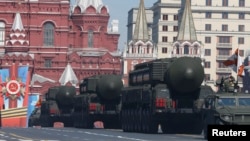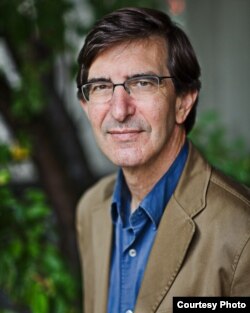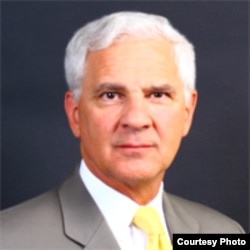WASHINGTON, D.C. —
U.S. forces are conducting large-scale nuclear "deter and detect" drills this week, just days after Russia conducted similar military exercises simulating retaliatory strikes to a hypothetical U.S. or NATO nuclear attack.
Their timing— during the tense standoff over Ukraine —combined with Cold-War-era rhetoric coming out of Moscow, have raised fears of a new nuclear arms race between the U.S. and Russia.
In 1994, the U.S., UK, Russia and Ukraine signed the so-called Budapest Memorandum to remove Soviet nuclear weapons from Ukraine.
In return, the three powers agreed to respect Ukraine’s independence, sovereignty and borders, and Ukraine signed the Nuclear Nonproliferation Treaty.
''The Budapest agreement is a fundamental memorandum, a fundamental element in the modern system of nuclear nonproliferation,” said Andrei Illarionov, a senior fellow at the Cato Institute’s Center for Global Liberty and Prosperity and former economic adviser to Russian President Vladimir Putin.
“By nullifying this document, Mr. Putin has demonstrated that the guarantees of the United States, the United Kingdom and Russia have no worth in the eyes of any prospective holders of nuclear weapons.”
The risk, says Illarionov, is that Iran, North Korea and other prospective nuclear countries will conclude that the only way to guarantee their own territorial integrity is by being nuclear powers. Implicit is the suggestion--which others have made-- that if Ukraine had not given up its nuclear weapons, Russia would never have dared interfere in Crimea.
“This is the most serious challenge to the system of international relations since the Second World War,” Illarionov said, “and unless the United States, the United Kingdom, the West as a whole are able to solve this problem in a reasonable period of time, it will lead to the nuclearization of the world.”
“Like a bad movie…”
It is a chilling warning for anyone old enough to remember the Soviet-era Cold War and global fears that at any time, one side might push the nuclear button, effectively eliminating the other and devastating the planet.
As Russia was conducting its military drill last week, Defense Minister Sergei Shoigu said Russia will quadruple the number of its long-range missiles by 2021.
Russia also announced it will colonize the Moon by 2030.
It was Russia’s launch of Sputnik in 1957 that opened up another front in the Cold War—and created the space race of the 1960s.
The Russian news agency RIA Novosti recently reported that Ukraine’s National Security and Defense Committee had introduced a bill to reestablish Ukraine as a nuclear power and demand financial compensation for Russia’s violation of its territory.
Earlier, CNN reported that two Ukrainian political parties had introduced a separate bill calling for the rejection of the country's 1994 accession to the 1968 Nuclear Nonproliferation Treaty.
“It’s like a bad movie,” George Perkovich, Director of the Nuclear Policy Program at the Carnegie Endowment for International Peace said.
“There is this pathetic rhetoric coming out of Russia and this pathetic political psychology that’s reminiscent of petty dictatorships whose leaders trump up all these great images of strength to mollify the people--and colonizing the moon is a part of that.”
Nuclear race unlikely
Joseph Cirincione, president of the Ploughshares Fund and author of several books on nuclear nonproliferation, said fears of nuclear fallout from the Ukraine crisis are unfounded.
Violating the Budapest Agreement is serious, he said, but because Budapest wasn’t a treaty, it is not enforceable.
“Nuclear weapons have never prevented conventional conflicts,” Cirincione said. “Israel was attacked conventionally long after it got nuclear weapons. India and Pakistan went to war long after both got nuclear weapons. China and Russia clashed conventionally long after both got nuclear weapons.”
Cirincione disagrees that Ukraine’s crisis could have been prevented if Ukraine had kept nuclear weapons.
“Weapons only deter the use of other nuclear weapons,” he said. “They don’t give states the kind of security that some people claim,” he said.
Cirincione said only two states are currently either looking to consolidate as a nuclear state or develop nukes, i.e., North Korea and Iran.
The International Atomic Energy Agency, or IAEA, recently reported Iran has diluted or converted nearly three-quarters of its weapons-grade stockpile, in accordance with the interim deal negotiated with the US, UK, Germany, France, Russia and China.
“There is growing international expectation that we are going to be able to get a deal with Iran by the July 20 deadline set by the interim agreement,” Cirincione. “If that happens, sanctions will start to be lifted and Iran will be open for business again.”
But that still leaves North Korea, which has continued with nuclear tests in defiance of U.S. sanctions and warnings from its only ally, China.
“North Korea already has nuclear weapons,” George Perkovich, director of the Nuclear Policy Program at the Carnegie Endowment for International Peace.
“It has tested them. There are no further arguments they need or would seek to justify whatever it is that they are doing.”
Like Cirincione, Perkovich does not view the crisis in Ukraine as a nuclear threat. He said Russia has nuclear weapon forces and is attaching great status and importance to those precisely because the country has declined in recent years.
“Its economy is in trouble; its demographic situation is negative; its public health situation is negative. So countries in that kind of condition often have parades with missiles and tell their people, ‘Look! We’re great!’” he said.
But Perkovich said that the crisis in Ukraine has a downside: It could make it much harder--both psychologically and politically--for U.S. President Barack Obama and Russian President Vladmir Putin to reduce their nuclear arsenals.
In 2010, Obama and then-Russian President Dmitry Medvedev signed the New START treaty, promising to reduce their stockpiles of nuclear missiles and launchers and commit to a series of annual nuclear inspections, a program that is ongoing.
Their timing— during the tense standoff over Ukraine —combined with Cold-War-era rhetoric coming out of Moscow, have raised fears of a new nuclear arms race between the U.S. and Russia.
In 1994, the U.S., UK, Russia and Ukraine signed the so-called Budapest Memorandum to remove Soviet nuclear weapons from Ukraine.
In return, the three powers agreed to respect Ukraine’s independence, sovereignty and borders, and Ukraine signed the Nuclear Nonproliferation Treaty.
''The Budapest agreement is a fundamental memorandum, a fundamental element in the modern system of nuclear nonproliferation,” said Andrei Illarionov, a senior fellow at the Cato Institute’s Center for Global Liberty and Prosperity and former economic adviser to Russian President Vladimir Putin.
“By nullifying this document, Mr. Putin has demonstrated that the guarantees of the United States, the United Kingdom and Russia have no worth in the eyes of any prospective holders of nuclear weapons.”
The risk, says Illarionov, is that Iran, North Korea and other prospective nuclear countries will conclude that the only way to guarantee their own territorial integrity is by being nuclear powers. Implicit is the suggestion--which others have made-- that if Ukraine had not given up its nuclear weapons, Russia would never have dared interfere in Crimea.
“This is the most serious challenge to the system of international relations since the Second World War,” Illarionov said, “and unless the United States, the United Kingdom, the West as a whole are able to solve this problem in a reasonable period of time, it will lead to the nuclearization of the world.”
“Like a bad movie…”
It is a chilling warning for anyone old enough to remember the Soviet-era Cold War and global fears that at any time, one side might push the nuclear button, effectively eliminating the other and devastating the planet.
As Russia was conducting its military drill last week, Defense Minister Sergei Shoigu said Russia will quadruple the number of its long-range missiles by 2021.
Russia also announced it will colonize the Moon by 2030.
It was Russia’s launch of Sputnik in 1957 that opened up another front in the Cold War—and created the space race of the 1960s.
The Russian news agency RIA Novosti recently reported that Ukraine’s National Security and Defense Committee had introduced a bill to reestablish Ukraine as a nuclear power and demand financial compensation for Russia’s violation of its territory.
Earlier, CNN reported that two Ukrainian political parties had introduced a separate bill calling for the rejection of the country's 1994 accession to the 1968 Nuclear Nonproliferation Treaty.
“It’s like a bad movie,” George Perkovich, Director of the Nuclear Policy Program at the Carnegie Endowment for International Peace said.
“There is this pathetic rhetoric coming out of Russia and this pathetic political psychology that’s reminiscent of petty dictatorships whose leaders trump up all these great images of strength to mollify the people--and colonizing the moon is a part of that.”
Nuclear race unlikely
Joseph Cirincione, president of the Ploughshares Fund and author of several books on nuclear nonproliferation, said fears of nuclear fallout from the Ukraine crisis are unfounded.
Violating the Budapest Agreement is serious, he said, but because Budapest wasn’t a treaty, it is not enforceable.
“Nuclear weapons have never prevented conventional conflicts,” Cirincione said. “Israel was attacked conventionally long after it got nuclear weapons. India and Pakistan went to war long after both got nuclear weapons. China and Russia clashed conventionally long after both got nuclear weapons.”
Cirincione disagrees that Ukraine’s crisis could have been prevented if Ukraine had kept nuclear weapons.
“Weapons only deter the use of other nuclear weapons,” he said. “They don’t give states the kind of security that some people claim,” he said.
Cirincione said only two states are currently either looking to consolidate as a nuclear state or develop nukes, i.e., North Korea and Iran.
The International Atomic Energy Agency, or IAEA, recently reported Iran has diluted or converted nearly three-quarters of its weapons-grade stockpile, in accordance with the interim deal negotiated with the US, UK, Germany, France, Russia and China.
“There is growing international expectation that we are going to be able to get a deal with Iran by the July 20 deadline set by the interim agreement,” Cirincione. “If that happens, sanctions will start to be lifted and Iran will be open for business again.”
But that still leaves North Korea, which has continued with nuclear tests in defiance of U.S. sanctions and warnings from its only ally, China.
“North Korea already has nuclear weapons,” George Perkovich, director of the Nuclear Policy Program at the Carnegie Endowment for International Peace.
“It has tested them. There are no further arguments they need or would seek to justify whatever it is that they are doing.”
Like Cirincione, Perkovich does not view the crisis in Ukraine as a nuclear threat. He said Russia has nuclear weapon forces and is attaching great status and importance to those precisely because the country has declined in recent years.
“Its economy is in trouble; its demographic situation is negative; its public health situation is negative. So countries in that kind of condition often have parades with missiles and tell their people, ‘Look! We’re great!’” he said.
But Perkovich said that the crisis in Ukraine has a downside: It could make it much harder--both psychologically and politically--for U.S. President Barack Obama and Russian President Vladmir Putin to reduce their nuclear arsenals.
In 2010, Obama and then-Russian President Dmitry Medvedev signed the New START treaty, promising to reduce their stockpiles of nuclear missiles and launchers and commit to a series of annual nuclear inspections, a program that is ongoing.







